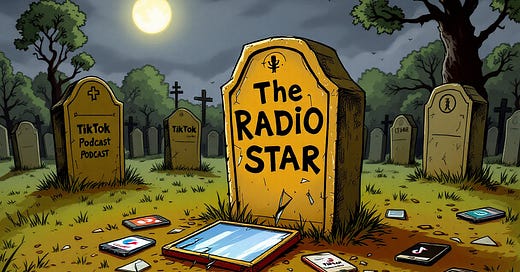The golden era of television salaries might be on the way out according to The Australian. With networks slashing budgets, renegotiating deals, even million-dollar faces aren't safe from the red pen.
But while TV tightens its belt, radio tells a different story.
Here, the salaries don’t just raise eyebrows, they leave their UK and US counterparts choking on their cereal.
Australia leads the world in FM radio salaries. Kyle Sandilands and Jackie O (KIIS FM) reportedly earn AU$10 million each annually, followed by Christian O’Connell (GOLD1043), whose latest contract is speculated to be in the vicinity of AU$4-5 million per year.
While less than these top earners, the remaining key radio personalities in Sydney and Melbourne still earn multi-million dollar salaries.
Having spent considerable time in the Australian radio industry, I can confirm this phenomenon of Australian radio talent commanding extravagant salaries isn’t new. Radio stations often lived or died by the talent headlining their breakfast shows; the bigger the name, the bigger the revenue.
The fierce competition between the three commercial radio networks for what has been a limited pool of top talent fuels exorbitant salaries. When contracts align, a bidding war erupts, driving offers sky high, with zero restraint,
Sound familiar?
For a long time, I didn’t have a problem with it. They were the drawcards. They delivered the numbers. They delivered the revenue. They earned it.
But that was then. This is now. And a lot has changed.
The Elephant in the Studio
These million-dollar talent deals sit in stark contrast to the rest of those in the industry. The pay gap between radio’s on-air royalty and the teams behind the scenes has never been wider.
As revenue declines, cost-cutting deepens, producers, content directors, integration staff, former colleagues, friends, passionate, smart, creative and hard working people are being let go.
And while we’re on the topic of stark contrasts, another disparity that is hard to digest; the exceptionally high salaries and the diminishing commitment from some of the top tier talent, some even brag about how little they work, like it’s a badge of honour.
Some seven figure earners even choose to start their on-air duties at 7:00 am, not 6:00 am with the commencement of the Breakfast show and the remaining team.
And then there’s the time off — six weeks and counting, and it’s only mid-year.
Nothing says relatable more than talent earning millions without apparent effort.
Remember the Hamish & Andy grind?
The Martin & Molloy sweat?
Matt Tilley writing his fingers to the bone?
Those days are about as current as a fax machine.
At a time when radio needs reinvention, many of its highest-paid stars seem to be embracing the art of hitting snooze … and doing less.
And when you put all of that together, it’s a hard pill to swallow.
Is the Pay Worth the Price?
Here’s the uncomfortable truth: radio no longer commands the revenue it once did.
So why are we still paying out obscene salaries?
They’re not just unsustainable, they’re killing the industry. When a handful of names absorb the lion’s share of investment, the rest of the industry dies, the ecosystem is hollowed out, producers cut, creatives gone, talent pipeline on pause. The people who care deeply about the medium are priced out of it.
At the same time, radio audiences are spending less time with it because they have a choice.
And here’s where it really hurts: when today’s highest-paid radio stars clock off after five hours and disconnect from the craft, they’re no longer the best in the business. They're just the best-paid.
The Big Rethink
Let me be clear. I love this industry.
Radio talent have been my companions for a lifetime.
This isn’t criticism for the sake of it, it’s about protecting the future of a medium I care deeply about.
The very foundation of radio is human connection.
But if the human connection on offer is costing the industry itself, then it won’t be TikTok or Podcasts that kill the radio star …
It will be radio that killed the radio star.





As someone who has worked in podcasting for the past 5 years and radio 5 years before that, you can feel the panic among radio teams about “their jobs being taken” by podcasters. But what is missing from this narrative is what you portray here without using the words “toxic”. Radio monopolies are a toxic environment brought about unfair incentives and an over commercialisation of what was once a creative setting.
Loved reading this!
Bang. Perfectly said